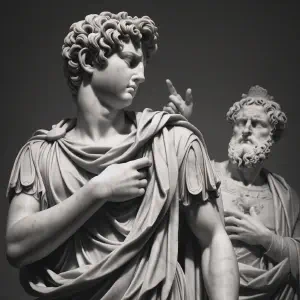Faith and Fortitude in the Face of Tyranny



In a final act of defiance and faith, the youngest son boldly proclaimed his allegiance to God’s commandments, denouncing the king’s cruelty and injustice. He accepted his fate with courage, joining his brothers in martyrdom. The mother’s faith and the sons’ bravery echoed as a timeless reminder of the power of faith and the triumph of the spirit over worldly tyranny and oppression. Their story, a beacon of hope and resilience, continues to inspire those who stand for truth and righteousness in the face of overwhelming adversity.
Five Questions
What does the story of the mother and her seven sons in 2 Maccabees tell us about faith under persecution?
This story is a powerful example of unwavering faith in the face of extreme persecution. It highlights the courage and resilience of individuals who choose to adhere to their religious beliefs, even under the threat of death. The mother and her sons exemplify the ultimate sacrifice for faith, showing that spiritual convictions can hold more weight than even the strongest earthly threats.
How does the mother’s role enhance the message of this narrative?
The mother’s role is pivotal. She’s not only a figure of maternal love but also of spiritual strength. Her exhortations to her sons to stay true to their faith, even in the face of death, underscore the importance of spiritual guidance and the influence of parental faith on future generations. Her character demonstrates how faith can provide strength and solace, even in the darkest of times.
In Psalm 17, there’s a theme of seeking justice and protection from God. How does this relate to the story in 2 Maccabees?
Psalm 17 resonates with the theme of seeking divine justice and protection, which aligns with the Maccabees’ narrative. The psalmist’s plea for God’s intervention and protection in the face of deceit and adversity mirrors the plight of the mother and her sons, who also rely on their faith in God’s justice and protection amidst their suffering and persecution. It’s a reminder that in times of trial, turning to God for strength and justice is a core aspect of faith.
The parable in Luke 19:11-28 speaks about stewardship and responsibility. How does this connect with the other readings?
The parable in Luke emphasizes the importance of stewardship and the consequences of our actions. It relates to the Maccabees’ story and Psalm 17 in showing that our actions, especially under trial, are significant. Just as the servants in the parable are accountable for what they do with what they’re given, the mother and her sons in 2 Maccabees demonstrate accountability to their faith. Their story is a testament to faithfully stewarding one’s beliefs and values, regardless of external pressures.
What broader lessons can we draw from these scriptures for our lives today?
These scriptures collectively teach us about the importance of steadfast faith, moral courage, and integrity in the face of challenges. They encourage us to hold firm in our beliefs and values, even when confronted with societal pressures or adverse circumstances. The narratives also highlight the significance of parental guidance in faith and the impact of our choices on our spiritual journey. In a broader sense, these lessons remind us that our faith and actions have profound implications not only for ourselves but also for our communities and future generations.
Bible Study
2 Maccabees 7:1, 20-31
It happened that seven brothers with their mother were arrested
and tortured with whips and scourges by the king,
to force them to eat pork in violation of God’s law.Most admirable and worthy of everlasting remembrance was the mother,
who saw her seven sons perish in a single day,
yet bore it courageously because of her hope in the Lord.
Filled with a noble spirit that stirred her womanly heart with manly courage,
she exhorted each of them
in the language of their ancestors with these words:
“I do not know how you came into existence in my womb;
it was not I who gave you the breath of life,
nor was it I who set in order
the elements of which each of you is composed.
Therefore, since it is the Creator of the universe
who shapes each man’s beginning,
as he brings about the origin of everything,
he, in his mercy,
will give you back both breath and life,
because you now disregard yourselves for the sake of his law.”Antiochus, suspecting insult in her words,
thought he was being ridiculed.
As the youngest brother was still alive, the king appealed to him,
not with mere words, but with promises on oath,
to make him rich and happy if he would abandon his ancestral customs:
he would make him his Friend
and entrust him with high office.
When the youth paid no attention to him at all,
the king appealed to the mother,
urging her to advise her boy to save his life.
After he had urged her for a long time,
she went through the motions of persuading her son.
In derision of the cruel tyrant,
she leaned over close to her son and said in their native language:
“Son, have pity on me, who carried you in my womb for nine months,
nursed you for three years, brought you up,
educated and supported you to your present age.
I beg you, child, to look at the heavens and the earth
and see all that is in them;
then you will know that God did not make them out of existing things;
and in the same way the human race came into existence.
Do not be afraid of this executioner,
but be worthy of your brothers and accept death,
so that in the time of mercy I may receive you again with them.”She had scarcely finished speaking when the youth said:
“What are you waiting for?
I will not obey the king’s command.
I obey the command of the law given to our fathers through Moses.
But you, who have contrived every kind of affliction for the Hebrews,
will not escape the hands of God.”
This passage from 2 Maccabees depicts a Jewish mother and her seven sons who are arrested and tortured by a Hellenistic king, Antiochus IV Epiphanes, for refusing to violate Jewish dietary laws. The mother plays a central role, demonstrating immense faith and courage, which aligns with Catholic values of martyrdom and sanctity of life. Her encouragement to her sons to die rather than transgress God’s commandments reflects the Catholic teachings on the primacy of God’s law, echoing the Ten Commandments. The narrative showcases the virtues of fortitude and faith under persecution, resonating with the Catholic emphasis on witnessing to faith, even unto death.
Psalm 17:1bcd, 5-6, 8b and 15
R. (15b) Lord, when your glory appears, my joy will be full.
Hear, O LORD, a just suit;
attend to my outcry;
hearken to my prayer from lips without deceit.
R. Lord, when your glory appears, my joy will be full.
My steps have been steadfast in your paths,
my feet have not faltered.
I call upon you, for you will answer me, O God;
incline your ear to me; hear my word.
R. Lord, when your glory appears, my joy will be full.
Keep me as the apple of your eye;
hide me in the shadow of your wings.
But I in justice shall behold your face;
on waking, I shall be content in your presence.
R. Lord, when your glory appears, my joy will be full.
In Psalm 17, attributed to King David, the psalmist pleads for God’s justice and protection against enemies. This plea for divine intervention and vindication is in line with the Catholic understanding of God as the ultimate judge and protector. The psalmist’s commitment to righteousness and calling upon God reflects the Catholic teachings on prayer and reliance on divine grace. The psalm aligns with the Catholic acts of mercy, specifically, the spiritual act of praying for the living and the dead, emphasizing a deep trust in God’s providential care.
Luke 19:11-28
While people were listening to Jesus speak,
he proceeded to tell a parable because he was near Jerusalem
and they thought that the Kingdom of God
would appear there immediately.
So he said,
“A nobleman went off to a distant country
to obtain the kingship for himself and then to return.
He called ten of his servants and gave them ten gold coins
and told them, ‘Engage in trade with these until I return.’
His fellow citizens, however, despised him
and sent a delegation after him to announce,
‘We do not want this man to be our king.’
But when he returned after obtaining the kingship,
he had the servants called, to whom he had given the money,
to learn what they had gained by trading.
The first came forward and said,
‘Sir, your gold coin has earned ten additional ones.’
He replied, ‘Well done, good servant!
You have been faithful in this very small matter;
take charge of ten cities.’
Then the second came and reported,
‘Your gold coin, sir, has earned five more.’
And to this servant too he said,
‘You, take charge of five cities.’
Then the other servant came and said,
‘Sir, here is your gold coin;
I kept it stored away in a handkerchief,
for I was afraid of you, because you are a demanding man;
you take up what you did not lay down
and you harvest what you did not plant.’
He said to him,
‘With your own words I shall condemn you,
you wicked servant.
You knew I was a demanding man,
taking up what I did not lay down
and harvesting what I did not plant;
why did you not put my money in a bank?
Then on my return I would have collected it with interest.’
And to those standing by he said,
‘Take the gold coin from him
and give it to the servant who has ten.’
But they said to him,
‘Sir, he has ten gold coins.’
He replied, ‘I tell you,
to everyone who has, more will be given,
but from the one who has not,
even what he has will be taken away.
Now as for those enemies of mine who did not want me as their king,
bring them here and slay them before me.’”After he had said this,
he proceeded on his journey up to Jerusalem.
The parable of the ten gold coins in Luke 19:11-28, told by Jesus, speaks about responsibility, stewardship, and accountability. The nobleman, symbolizing Jesus, entrusts his servants with resources, mirroring God entrusting talents to each individual. The varying responses of the servants reflect different attitudes towards God’s gifts, aligning with Catholic teachings on the responsible use of one’s talents and resources. This passage underscores the Catholic value of stewardship of God’s creation and the necessity of active participation in God’s work, relating to the Catholic understanding of grace as both a gift and a responsibility to be enacted in the world.
Lessons
These passages teach us the profound strength of faith in the face of adversity and the power of hope amidst suffering. They remind us that true courage is found in standing firm in our beliefs, even against overwhelming odds. The story of the mother and her sons in 2 Maccabees exemplifies unwavering faith and the willingness to embrace martyrdom for the sake of God’s law. The psalm reinforces the trust in God’s justice and protection. The parable in Luke teaches the importance of stewardship, responsibility, and the consequences of our actions. Together, these scriptures encourage us to remain steadfast in our faith journey, persevering through trials with the hope of eternal reward.
Meditation Prayer


